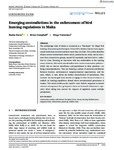Emerging contradictions in the enforcement of bird hunting regulations in Malta
| dc.contributor.author | Ferns, B | |
| dc.contributor.author | Campbell, Brian | |
| dc.contributor.author | Veríssimo, D | |
| dc.date.accessioned | 2022-07-29T13:48:44Z | |
| dc.date.available | 2022-07-29T13:48:44Z | |
| dc.date.issued | 2022-04 | |
| dc.identifier.issn | 2578-4854 | |
| dc.identifier.issn | 2578-4854 | |
| dc.identifier.other | e12655 | |
| dc.identifier.uri | http://hdl.handle.net/10026.1/19465 | |
| dc.description.abstract |
<jats:title>Abstract</jats:title><jats:p>The archipelago state of Malta is renowned as a “blackspot” for illegal bird hunting. Since joining the European Union (EU), Maltese hunters have experienced restrictions on what and how much they can hunt. This article describes Malta's current enforcement efforts which, assisted by the Army and by volunteers from conservation groups, exceed EU standards, and have led to a reduction in crime. Drawing on interviews with key stakeholders in the hunting arena, however, this article also describes how current conservation policies—which rely on intense surveillance and punishment to deter poachers—are being counterproductive. They are fostering a culture of suspicion and distrust between hunters, environmental nongovernmental organizations, and the state, which, in turn, drives the further intensification of surveillance. This increase has encouraged some hunters to engage in other forms of crime or to embark on hunting expeditions abroad where environmental governance is weaker. This article reinforces the need for more holistic responses to natural resource management that go beyond a focus on increased enforcement, especially when taking into account the impacts of regulation across multiple jurisdictions.</jats:p> | |
| dc.language | en | |
| dc.language.iso | en | |
| dc.publisher | Wiley Open Access | |
| dc.subject | conservation conflict | |
| dc.subject | enforcement | |
| dc.subject | European Union | |
| dc.subject | harms | |
| dc.subject | hunting | |
| dc.subject | Mediterranean | |
| dc.subject | migratory birds | |
| dc.subject | militarization | |
| dc.subject | poaching | |
| dc.subject | wildlife crime | |
| dc.title | Emerging contradictions in the enforcement of bird hunting regulations in Malta | |
| dc.type | journal-article | |
| dc.type | Journal Article | |
| plymouth.author-url | https://www.webofscience.com/api/gateway?GWVersion=2&SrcApp=PARTNER_APP&SrcAuth=LinksAMR&KeyUT=WOS:000760842500001&DestLinkType=FullRecord&DestApp=ALL_WOS&UsrCustomerID=11bb513d99f797142bcfeffcc58ea008 | |
| plymouth.issue | 4 | |
| plymouth.volume | 4 | |
| plymouth.publication-status | Published | |
| plymouth.journal | Conservation Science and Practice | |
| dc.identifier.doi | 10.1111/csp2.12655 | |
| plymouth.organisational-group | /Plymouth | |
| plymouth.organisational-group | /Plymouth/Faculty of Arts, Humanities and Business | |
| plymouth.organisational-group | /Plymouth/Faculty of Arts, Humanities and Business/School of Society and Culture | |
| plymouth.organisational-group | /Plymouth/REF 2021 Researchers by UoA | |
| plymouth.organisational-group | /Plymouth/REF 2021 Researchers by UoA/UoA20 Social Work and Social Policy | |
| plymouth.organisational-group | /Plymouth/Users by role | |
| plymouth.organisational-group | /Plymouth/Users by role/Academics | |
| dcterms.dateAccepted | 2022-02-02 | |
| dc.rights.embargodate | 2022-7-30 | |
| dc.identifier.eissn | 2578-4854 | |
| dc.rights.embargoperiod | Not known | |
| rioxxterms.versionofrecord | 10.1111/csp2.12655 | |
| rioxxterms.licenseref.uri | http://www.rioxx.net/licenses/all-rights-reserved | |
| rioxxterms.type | Journal Article/Review |


